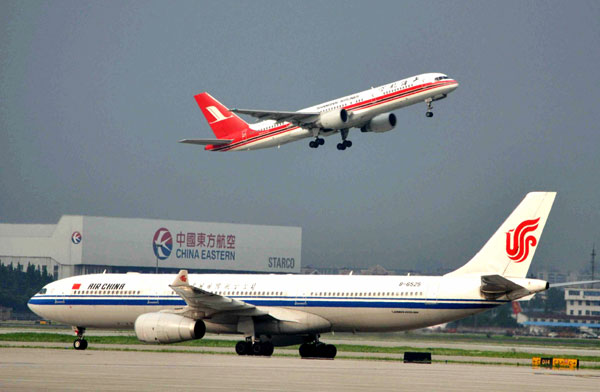

A senior official from the Civil Aviation Administration of China said on Friday that the country disapproved and "will not accept any unilateral and compulsory market measures", after the European Union threatened Chinese carriers with fines for non-compliance with its Emissions Trading System, or ETS.
Speaking at the 2013 China Civil Aviation Development Forum in Beijing, Yan Mingchi, deputy director-general of the policy, law and regulation department under the CAAC, said that "airlines in developing countries should be provided with financial and technological support in their efforts at coping with the effects of climate change".
 |
|
Shanghai Hongqiao International Airport. Eight Chinese airlines are facing possible fines for not paying for their emissions during flights within countries of the European Union. Yan Daming / For China Daily |
He added that a balance must be maintained between the development of the international aviation industry and emission reduction targets.
Eight Chinese and two Indian airlines are facing possible fines for not paying for their emissions during flights within the EU, the European Commission announced on Friday.
It said member states could fine the companies under the terms of the ETS, which is designed to cut CO2 emissions.
Greenhouse gas emissions from those countries participating in the ETS dropped by 2 percent in 2012, and aircraft operators responsible for 98 percent of the 2012 aviation emissions covered by the ETS have taken the necessary steps to date to comply with the ETS legislation, the EU said in a statement.
"All cases of non-compliance will be examined ... in accordance with established procedures," it added.
The Chinese and Indian airlines identified have not submitted their 2011 carbon emission data to the EU yet, whereas 1,200 other carriers have already handed over their reports, said the statement.
The Chinese carriers could face fines totaling 2.4 million euros ($3.09 million), and the two Indian airlines face fines of 30,000 euros, The New York Times reported.
The EU decided to suspend its ETS in February to wait for a global market-based mechanism to cut emissions, to be discussed at the International Civil Aviation Organization's meeting in September.
However, Yan insisted that technology and operational improvements are the most effective methods of aviation emission reduction, rather than the carbon tax, and that developing countries should be assisted in achieving those.
Statistics from the CAAC show that the Chinese civil aviation industry reduced its carbon emissions by 240,000 metric tons in 2012 compared with 2011.
Yan added that the country has continued to attach huge significance to aviation emissions and has made progress through optimizing its airspace structure and other technological methods.
China Eastern Airlines Co Ltd became the first Chinese carrier on Friday to get an Airbus 320 aircraft, equipped with special wing-tip devices that cut emissions.
The devices, known as "sharklets", are placed at right angles at the end of the wing. They are made from light-weight materials that can offer up to 4 percent fuel reduction, according to Airbus.
"China Eastern will introduce 97 more sharklet-equipped A320 aircraft to our fleet," said Shu Mingjiang, its vice-president of flight operations.
Shu added that China Eastern plans to add about 200 new aircraft between 2013 and 2015, which will improve the airlines' overall fuel efficiency.
The use of advanced biofuels - a recognized safe and efficient method of reducing carbon emissions - in aviation is also becoming a major industry issue for airlines and aircraft manufacturers.
Guenther Matschnigg, senior vice-president of the International Air Transport Association, told the Beijing forum that governments should encourage the use of aviation biofuel, and that if all flights used it, carbon emissions could be cut by 80 percent.
A spokesman for Air France-KLM Group also added that biofuel is currently the industry's best alternative to helping reduce carbon emission.
He added the use of biofuel reduces the ecological footprint in the air and on the ground, and that the French carrier expects the fuel to account for 1 percent of its fuel needs by 2015.
Air China took its first test flight using biofuel in 2011, and China Eastern has also completed a test flight using a mix of fuels including used cooking oil - or gutter oil - and palm oil, in April.
However, the high price of biofuel is still a challenge to the industry, at almost six times that of conventional fuel.
 Top 10 most popular high-end goods, trends in China
Top 10 most popular high-end goods, trends in China
 Young sword smith carries on family craft
Young sword smith carries on family craft
 Bike sharing around the globe
Bike sharing around the globe
 A glimpse of coffee exchange in Chongqing
A glimpse of coffee exchange in Chongqing
 Looking ahead to New York auto show
Looking ahead to New York auto show
 A ceramics kiln that keeps old tradition burning
A ceramics kiln that keeps old tradition burning
 The challengers set to take on AlphaGo in May
The challengers set to take on AlphaGo in May
 Top 10 most popular cities during Qingming holiday
Top 10 most popular cities during Qingming holiday